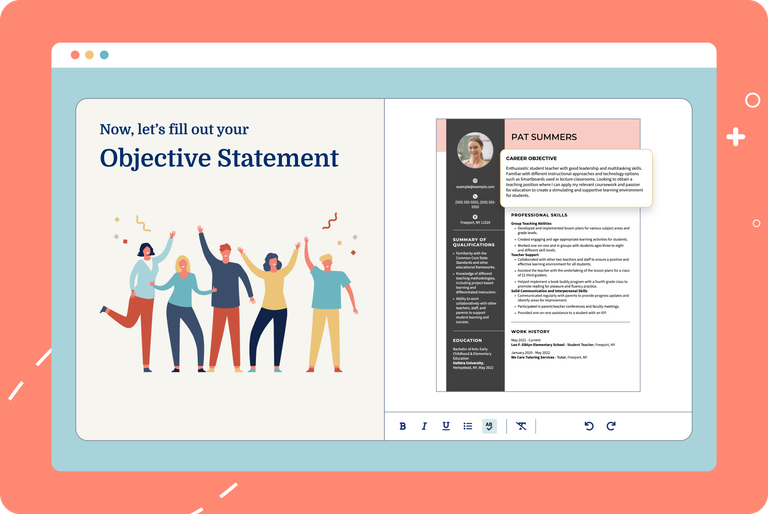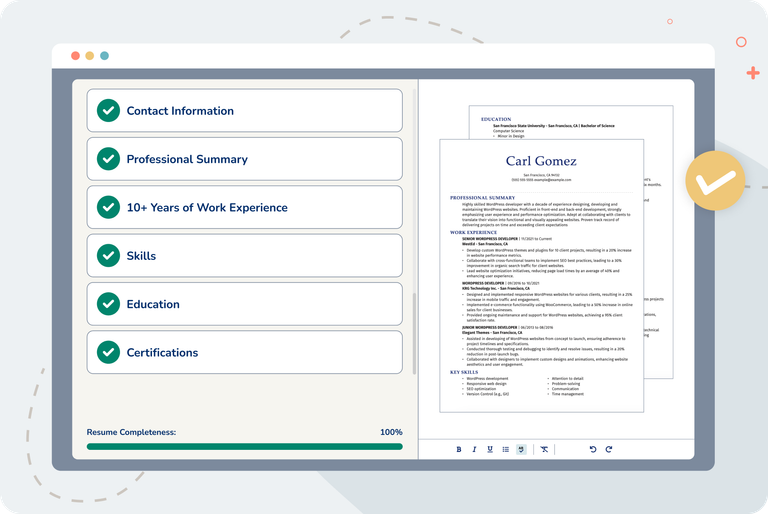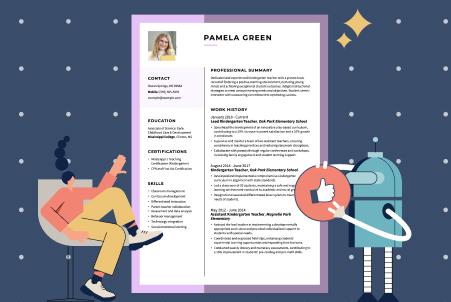Table of Contents
Get started with MyPerfectResume today!
- Build a resume on any device
- Pick an ATS-friendly template
- Tailor with AI copy suggestions
Why this resume works
- Uses action-oriented language: Uses dynamic action verbs like “treat,” “reduce,” and “implement” to showcase the job seeker’s proactive approach and engagement in their roles.
- Quantifies accomplishments: This resume quantifies achievements by citing specific metrics, such as treating over 500 patients annually and improving patient satisfaction by 30%, demonstrating a clear impact.
- Illustrates problem-solving ability: Showcases effective problem-solving skills and innovative solutions by detailing the implementation of new care protocols and reducing ER wait times.
More Medical Doctor Resume Examples
Explore more doctor resume examples to see the best ways to highlight your medical expertise, patient care skills, and clinical experience. These medical resume examples will guide you in creating a resume that showcases your professional qualifications effectively.
Entry-Level Doctor
Why this resume works
- Features education section: The education section stands out by clearly presenting degrees from prestigious institutions, emphasizing academic excellence crucial for medical professionals early in their careers.
- Touches on awards and recognition: Awards and honors are prominently featured, affirming the candidate’s exceptional contributions to clinical research and patient care and highlighting their high level of performance.
- Shows digital literacy: Indicates digital literacy and computer skills through references to clinical research technologies and patient care protocols, showcasing readiness for modern medical practices.
Mid-Level Doctor
Why this resume works
- Demonstrates language abilities: The resume underscores language skills through specific mentions of English, Spanish, and French fluency, complemented by cross-cultural communication in diverse medical settings.
- Hones in on real impact: Achievements like a 15% reduction in patient recovery time and saving $25K annually on records system illustrate tangible impacts for potential employers.
- Displays technical expertise: Technical expertise is displayed with advanced certifications like ACLS and successful implementation of electronic health record systems, highlighting specialized skills crucial for the role.
Experienced Doctor
Why this resume works
- Showcases impressive accomplishments: The resume showcases impressive accomplishments by detailing significant achievements such as reducing patient wait times and improving recovery rates, reflecting senior-level impact.
- Focuses on work history: The chronological resume format effectively emphasizes work history, making it easy to follow the candidate’s career progression in the medical field.
- Emphasizes leadership skills: Highlights leadership skills through achievements like leading a team of medical staff and implementing successful telemedicine services, showing strong management capabilities.
Medical Doctor Resume Template (Text Version)
Hiro Tanaka
Cedar Valley, MN 55127
(555)555-5555
Hiro.Tanaka@example.com
Professional Summary
Compassionate Doctor with 7 years of clinical experience. Proven track record in patient care, surgical assistance, and clinical research. Adept at managing healthcare teams and enhancing patient satisfaction through innovative care protocols.
Work History
Doctor
Riverside Medical Group – Cedar Valley, MN
March 2022 – March 2025
- Treated over 500 patients annually
- Reduced ER wait time by 20%
- Implemented new patient care protocols
Medical Practitioner
Greenfield Hospital – Cedar Valley, MN
March 2018 – February 2022
- Managed patient treatment plans
- Improved patient satisfaction by 30%
- Supervised a team of 5 nurses
Assistant Doctor
Harmony Health Center – Minneapolis, MN
March 2015 – February 2018
- Assisted in over 100 surgeries
- Developed patient education programs
- Conducted clinical research projects
Languages
- English – Beginner (A1)
- Spanish – Beginner (A1)
- French – Intermediate (B1)
Skills
- Patient Care
- Clinical Diagnosis
- Surgical Procedures
- Emergency Medicine
- Medical Research
- Team Leadership
- Patient Communication
- Healthcare Management
Certifications
- Board Certified in Internal Medicine – American Board of Medical Specialties
- Advanced Cardiac Life Support (ACLS) – American Heart Association
- Pediatric Advanced Life Support (PALS) – American Heart Association
Education
Doctor of Medicine (MD) Medicine
Harvard Medical School Cambridge, Massachusetts
June 2015
Bachelor of Science (BS) Biology
University of California, Berkeley Berkeley, California
June 2011
Popular Skills for a Medical Doctor Resume
A strong skills section on a doctor’s resume is important for highlighting both medical expertise and key personal qualities. Skills such as diagnosing illnesses and performing surgeries should be balanced with communication, empathy, and teamwork to ensure the best patient care.
Below are a few of the top soft skills frequently listed on medical doctor resumes.
| Soft Skills | % of resumes with this skill |
|---|---|
| Ethical practice | 20.00% |
| Teaching and mentoring | 8.70% |
| Interdisciplinary team coordination | 5.26% |
Here are a few examples of hard skills frequently included on medical doctor resumes.
| Hard Skills | % of resumes with this skill |
|---|---|
| Patient counseling | 25.32% |
| Medical knowledge | 24.05% |
| Diagnosis and treatment | 23.08% |
| Patient education | 21.79% |
| Physical examination | 9.09% |
Related Resume Guides
- Clinical Documentation Improvement Specialist
- Clinical Project Manager
- Clinical Research Assistant
- Clinical Trial Associate
- Coding Specialist
- Dermatologist
- Dialysis Technician
- Electrocardiograph Technician
- Emergency Department Technician
- Emergency Room Registration Clerk
- Equipment Technician
- Health Information Technician
- Hospital Administrator
- Hospital Volunteer
- Intake Coordinator
- Intensive Care Physician
- Medical Laboratory Technologist
- Medical Records Specialist
- Medical Representative
- Medical Research Assistant
- Midwife
- MRI Technologist
- Neurosurgeon
- Nuclear Medicine Technologist
- OB-GYN Medical Assistant
- Ophthalmologist
- Ophthalmology Assistant
- Optometrist
- Orthopedic Surgeon
- Pediatric Assistant
- Pediatrician
- Physician
- Physician Assistant
- Podiatrist
- Psychiatrist
- Radiologist
- Radiology Technician
- Resident Medical Officer
- Respiratory Therapist
- Speech Language Pathologist
- Surgeon
- Surgery Scheduler
- Ultrasound Technician
Advice for Writing Your Medical Doctor Resume
Explore our tips on how to write a resume and learn how to effectively highlight your medical expertise, patient care skills, and dedication to healthcare excellence. Discover tailored advice to help you stand out in the competitive medical field.
Write a strong professional summary
A professional summary is a short introduction at the top of your resume that showcases your main skills, experiences, and achievements as a doctor. It’s designed to quickly capture the employer’s interest and make a strong first impression.
Experienced doctors should use this section to highlight their expertise and significant accomplishments in medicine, including specific skills such as patient care, diagnosis, and any specialties.
For those with limited experience or beginning their medical career, it’s better to opt for a resume objective. Your objective should emphasize your career aspirations and how you aim to contribute to the healthcare team.
When crafting your professional summary or objective, ensure it is clear and concise. Highlight notable achievements or unique skills that differentiate you from other candidates and focus on what makes you an ideal fit for the job title of doctor.
Doctor resume summary examples
Entry-level
Compassionate and dedicated recent medical school graduate with a Doctor of Medicine (MD) degree and residency training in internal medicine. Certified by the American Board of Internal Medicine (ABIM) and skilled in patient assessment, diagnosis, and treatment planning. Adept at utilizing electronic health records (EHR) systems and committed to providing high-quality, evidence-based care to diverse patient populations.
Mid-career
Experienced internal medicine physician with over 7 years of practice in both hospital and private clinic settings. Proficient in managing chronic conditions, performing diagnostic tests, and developing comprehensive treatment plans. Board-certified by the American College of Physicians (ACP) with specialized expertise in endocrinology and cardiovascular health. Recognized for exceptional patient communication skills and a strong commitment to continuing medical education.
Experienced
Highly accomplished chief medical officer with over 20 years of experience leading multidisciplinary healthcare teams in large hospital networks. Expertise in advanced cardiology procedures, clinical research, and healthcare administration. Proven track record of implementing innovative patient care protocols that enhance quality outcomes and operational efficiency. Board-certified cardiologist with numerous publications in peer-reviewed journals and a history of mentoring emerging medical professionals.
Doctor resume objective examples
Recent graduate
Compassionate and dedicated recent medical school graduate seeking an entry-level position as a general practitioner. Eager to apply extensive clinical training, strong diagnostic skills, and a patient-centered approach in a reputable healthcare facility. Committed to contributing to patient wellness and community health.
Career changer
Detail-oriented professional transitioning from biomedical research to clinical practice as a physician. Leveraging extensive knowledge of human physiology, disease mechanisms, and research-based evidence to provide high-quality patient care. Enthusiastic about joining a collaborative medical team to enhance patient outcomes through innovative treatment strategies.
Specialized training
Board-eligible internal medicine graduate with specialized training in endocrinology seeking an entry-level position in a hospital or clinic setting. Passionate about utilizing expertise in metabolic disorders and patient education to improve chronic disease management and promote holistic health care practices.
Need help creating a professional resume? Our Resume Builder makes it easy to highlight your medical skills and experience.
Include relevant certifications and training
It is essential to list credentials such as certifications, licenses, and specialized training on your resume. These credentials prove your qualifications and expertise in the medical field. A dedicated certifications section allows you to highlight these important details prominently on your resume.
This can be an enhancement alongside your education section, showing a comprehensive view of your professional background.
To create this section, list your medical license and any board certifications you hold. Include other relevant credentials like Advanced Cardiac Life Support (ACLS) or Pediatric Advanced Life Support (PALS). Organize the certifications in reverse chronological order, starting with the most recent. Clearly state the issuing body and the date obtained for each certification.
Examples of industry-recognized certifications include:
- American Board of Internal Medicine Certification
- Advanced Trauma Life Support (ATLS)
- Basic Life Support (BLS)
Highlighting these achievements shows potential employers that you have met rigorous standards and are committed to ongoing professional development.
Example of a certifications section
Board Certified in Internal Medicine
Issued by: American Board of Internal Medicine (ABIM)
Issued 2021
Advanced Cardiovascular Life Support (ACLS)
Issued by: American Heart Association (AHA)
Expires 2024
Pediatric Advanced Life Support (PALS)
Issued by: American Heart Association (AHA)
Expires 2025
Certified Medical Examiner
Issued by: Federal Motor Carrier Safety Administration (FMCSA)
Issued 2022
Basic Life Support (BLS)
Issued by: American Heart Association (AHA)
{Expires 2023}
We recommend using one of our professional resume templates to easily create a polished resume that stands out to recruiters and hiring managers.
Showcase your work experience
Highlighting your work experience on a resume is essential as a doctor, as it allows potential employers to understand your qualifications, skills, and past contributions. Arranging your work history in reverse chronological order ensures that the most current and pertinent information is prominently displayed.
This format should include your job title, employer name, location, and dates of employment.
When describing your work experience, use concise, action-oriented bullet points for clarity. For instance:
- Diagnosed and treated over 200 patients weekly at XYZ Hospital
- Led a team of 15 medical professionals during emergency responses
- Implemented new patient care protocols that reduced hospital stays by 10%
Incorporate measurable outcomes to effectively showcase your impact. Emphasize key responsibilities like diagnosing illnesses, creating treatment plans, performing surgeries, or managing patient care. This method demonstrates not only what you accomplished but also the effectiveness of your actions.
5 medical doctor work history bullet points
- Diagnosed and treated over 1,000 patients annually, resulting in a 95% patient satisfaction rate.
- Implemented a new electronic medical record system, reducing documentation errors by 40%.
- Led a team of 10 healthcare professionals in the emergency department, improving response times by 25%.
- Conducted clinical research on hypertension, contributing to a published study with findings that improved treatment protocols.
- Developed patient care plans tailored to individual needs, increasing recovery rates by 20%.
To get past ATS and catch recruiters’ eyes, use important keywords from the job posting in your resume.
Match your resume with the job description
Personalizing your resume to match the job description is essential for catching employers’ attention and passing applicant tracking systems (ATS) scans.
ATS software reviews resumes for specific keywords that align with the job posting. By customizing your resume to include these terms, you boost the likelihood of it being reviewed by a human recruiter.
Begin by thoroughly examining the job description and noting key terms and skills mentioned. These may include medical procedures, patient care, or software knowledge.
To create an ATS-friendly resume, integrate these keywords into your resume skills section or within bullet points under relevant job experiences.
For instance, if the job listing mentions “administered patient treatments,” you could write: “Administered various patient treatments to improve health outcomes.”
Structure your resume to prominently feature these critical areas. Use clear section headings such as “Experience,” “Education,” and “Certifications.” Ensure achievements are measurable, like “Improved patient satisfaction scores by 20% through personalized care plans.”
This method not only makes your resume more attractive to ATS but also showcases your qualifications to potential employers.
Use our ATS Resume Checker to make sure your resume gets seen by employers. It checks important parts and helps you improve right away.
FAQ
Do I need to include a cover letter with my medical doctor resume?
Adding a cover letter to your resume allows you to emphasize your interest in the particular position or medical facility and how your qualifications meet their specific needs.
Highlight unique accomplishments, such as successful case studies or specialized training, that may not be thoroughly detailed in your resume. Explore doctor cover letter examples for inspiration and guidance.
If the hospital features unique elements like advanced technology, research opportunities, or community initiatives, mentioning how these fit with your professional aspirations and expertise could be advantageous.
This personalization proves your genuine interest and dedication to the role, helping you stand out among other candidates. See our cover letter examples for tips on customizing your cover letter to the job you are applying for.
Ultimately, even if a cover letter isn’t explicitly required, a customized one can enhance your application. You can use our Cover Letter Generator for personalized content suggestions and expert tips to guide you.
How long should a medical doctor’s resume be?
For a medical doctor’s resume, aim for two pages to thoroughly present your education, clinical experience, and specializations. The two-page resume format allows you to include important achievements such as residencies, fellowships, research contributions, and certifications without overwhelming the reader.
Emphasize relevant details like patient care skills, surgical procedures performed, or leadership roles in medical settings. Tailor your document to highlight what’s most pertinent to the position you’re applying for while keeping it clean and organized.
Explore our guide on how long a resume should be for additional tips and examples.
How do you write a medical doctor resume with no experience?
Creating a resume with no experience as a medical doctor involves highlighting your education, clinical rotations, and relevant skills.
Begin with your education section at the top, including your medical degree, the institution you attended, and your graduation date. Mention any honors or notable projects or research from your school days.
Next, focus on your clinical rotations to demonstrate practical experience. Detail each rotation by specifying the department (e.g., pediatrics, emergency medicine), outlining your responsibilities, and noting any significant achievements or learning experiences.
Add a skills section where you list both hard skills (like patient assessment and diagnostic abilities) and soft skills (such as communication and teamwork). If you’ve been involved in healthcare-related volunteer work or attended workshops and conferences, include these under “Professional Development” or “Volunteer Experience.”
Lastly, customize your resume for each job application by emphasizing aspects of your training that match the specific role you’re pursuing.
Share this page
Additional Resources

Doctor Cover Letter Example & Templates
The relationship between doctor-patient is a critical one. When constructing a doctor cover letter, the candidate has to express not merely their skill in the field, but their compassion for

The Illusion of Wage Growth: Where Paychecks Stretch the Farthest
U.S. wages have climbed at one of the fastest rates in modern history. Between 2020 and 2024, the average American worker’s pay rose from about $64,000 to $75,600, an 18%

100+ Resume Objective Statement Examples & Best Practices
In just a sentence or two, a resume objective statement tells hiring managers the role or career path you’re aiming for and the unique skills and value you bring to

150+ Skills for a Resume: Examples for Any Job
Crafting a standout resume starts with highlighting the skills and qualifications that demonstrate your fit for the role. But in a crowded job market, knowing which abilities will actually catch

When to Use a Two Page Resume (With Examples & Formatting Tips)
If you’ve spent years building your skills, growing in your career, and racking up accomplishments, a one-page resume might not cut it. A two-page resume gives you space to present a

How to Make an ATS Friendly Resume (Templates & Guide)
In today’s fast-paced hiring climate, many employers use applicant tracking systems (ATS) to organize, store, and screen candidate information. Optimizing your resume for ATS is essential for ensuring your application passes
